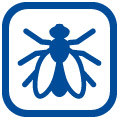 |
President Netherlands
Vice-President Laura Gasco University of Turin, Italy laura.gasco@unito.it
|
Secretary Jørgen Eilenberg,University of Copenhagen, Denmark Christoph Sandrock Research Institute of Organic Agriculture FiBL, Switzerland christoph.sandrock@fibl.org Industry Representative IIC (International Insect Centre), Netherlands marianpeters@ngn.co.nl Young Scientists M.Ottoboni, Italy M.Shumo, Germany |
The commercial insect sector is relatively new and the sector is facing with many research questions for further innovation of the insect chain. The Study Commission on Insects addresses all questions in the area of biomass as substrate for insect rearing, nutritional requirements of insects, insect production, processing methods of insect products, feeding value of insects (products) in animal feed, functional properties of insect products in animal feed, market applications, regulatory issues, consumer acceptance, environmental and socio-economic sustainability. Frequently joint sessions will be organised with other Study Commissions addressing different disciplines, such as animal genetics, physiology, nutrition, animal health and welfare.
The sessions organized by the Study Commission on Insects are generally well attended which makes the annual EAAP conference the most relevant annual scientific meeting for scientists working in the field of Insects for feed in Europe, with an increasing interest and participation of non-European scientists. It will also bring the positive side to expose other animal scientists to topics organized by the Study Commission on Insects and, at the same time scientists dealing with research on insects can use the opportunity to participate to sessions of other animal science topics.
The scope of the Study Commission on Insects is best reflected by the range of topics covered in the session organized at the annual EAAP meetings. Presently, the topics are mostly from the following areas:
Insects in a circular economy
Reducing wastes, creating / converting low grade to high grade protein, upgrading biomass to high quality products, safe products, biodiversity, reduction of water usage, land use, LCA.
Insect production
Upscaling of production, microbiological issues, reduction of manpower through automation, selection of suitable insects for specific indications and locations, insect diseases.
Potential of insect products for feed, food and non-food
Novel processing approaches, developing protocols to determine nutrient requirements of insects, digestibility of insect products in animal feed, optimal and natural feeds, improve shelf life and use of components of insects (e.g., chitin) in feed, food and non-food applications.
Safety, regulatory issues and consumer acceptance
Safe products, HACCP, Standardisation of methods and parameters
While we aim at having some of the top scientists in the respective field as invited speakers for a given topic, we also provide substantial room for presentations of early career scientists, including a newly established competition for the best presentation of younger colleagues.
Meetings organized by the Study Commission on Insects provides an unprecedented opportunity to connect all players along the entire value chain while maintaining focus despite the diversity of expertise and keeping the targeted objectives in focus: (1) circular economy, (2) insect production, (3) potential of insect products for feed, food and non-food and (4) safety, regulatory issues and consumer acceptance. The meetings will include a highly interdisciplinary, intersectoral scientific community with private and public institutions targeting on stakeholders with different expertise such as engineers (industrial designers); biologists (entomologists, environmentalists, waste management); geneticists for optimal breeding of insect species; food safety and risk assessment specialists (microbiologists, toxicologists, chemists and HACCP specialists); nutritionists, health specialists (allergists, veterinarians); management, market and legal analysts (for economics, entrepreneurship, law and regulatory issues, market analysis); social scientists (for consumer, psychology) as well as NGOs, regulators, risk assessors, policy makers, large and small industry and entrepreneurs.